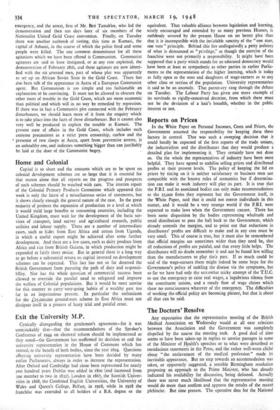Home and Colonial
Capital is so short and the amounts which are to be spent on colonial development schemes are so 'large that it is essential for that reason alone that all reports on the progress and prospects of such schemes should be watched with care. The interim report of the Colonial Primary Products Committee which appeared this week is only the latest of a miscellaneous series of statements, but it shows clearly enough the general nature of the case. In the great majority of projects the expansion of production to a level at which it would yield large benefits to consuming countries, including the United Kingdom, must wait for the development of the basic ser- vices of transport, land survey and agricultural research, public utilities and labour supply. There are a number of intermediate cases, such as hides from East Africa and cotton from Uganda, at which a useful export might be 'achieved after some further development. And there are a few cases, such as dairy produce from Africa and rice from British Guiana, in which production might be expanded at fairly short notice. But in general there is a long way to go before a substantial return on capital invested on development schemes can be expected. This fact has not so far deterred the British Government from pursuing the path of duty and responsi- bility. Nor has the whole question, of commercial success been allowed to override the parallel need to safeguard and improve the welfare of Colonial populations. But it would be most unwise for this country to carry,-easy-going habits of a wealthy past too far in an impecunious present. In particular the enthusiasm for the £25,000,000 ground-nuts scheme in• East Africa must not dissipate itself in a process of hasty trial and painful error.






























 Previous page
Previous page